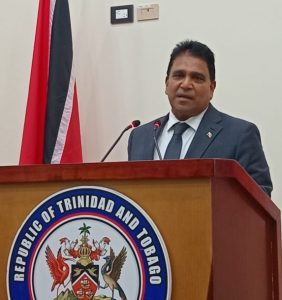THREE umbrella bodies of the trade unions issue a statement on the 2023/2024 Budget delivered by Finance Minister Colm Imbert last Monday in the Lower House.
On Sunday, the Joint Trade Union Movement (JTUM), National Trade Union Centre (NATUC) and Federation of Independent Trade Unions and NGOs (FITUN) criticised the Budget:
- Questions whether 196,000 working for minimum wage;
- 4% offer an insult;
- Majority don’t support 65 years as retirement age; and
- All is not well in energy sector;
Below AZP News carries the release in full:
The budget for 2024 was woefully short to reach the target to meet the needs of people of lower income. We challenge the minister’s figure of 196,000 persons working for minimum wage.
On the ground, our calculations are about 450,000 who earn less than $5,000. To add insult to injury, Mr Minister of Finance stood up in all his glory and thought it was fitting for those on the lower end of the scale to receive an increase of $3. That is a blatant insult to workers. Before, a minimum wage worker received $3,032 per month, barely covering rent alone. Now, The Minister of Finance and this Administration are saying that $3,553 should suffice. At the same time, he insists on bringing property tax, which will immediately increase rent, which most minimum wage earners are paying.
The minister of finance just did what was expected by most, which was nothing. He give no consideration for reviewing the unjust and unfair 4% for those unions who have not settled yet. The 4% offer over six years for those daily rated workers at the lower end of the economic bracket translates to an increase of a mere $4.70 per day, which is $47 dollars a fortnight or $94 dollars a month for one negotiating period.
We wish to remind the minister that retroactive pay is not a gift; it is a right, and it is money already earned and owed. Secondly, the figure, when translated to an individual worker, means that a daily rated paid worker will, in fact, be getting the value of $61.84 per month in back pay over ten years, which amounts to $7,419.60. This is a grave insult to workers at the lower end of the scale.

We challenge the minister of finance’s statement that a majority of stakeholders support increasing the retirement age to 65. We challenge the minister to name those stakeholders, as the labour movement has been very vocal against raising the retirement age to 65.
The increase in the retirement age is purported to address the NIB gap between revenue and benefits payments. Ironically, the minister identified some 200,000 workers outside of the NIB structure, in addition to the hundreds of employers who evade their legal requirement to make contributions towards the sustenance of the NIB scheme, but nothing was mentioned about how they are going to increase the collection net and rein in those non-compliant employers.
There was nothing identified concerning how young workers with decent jobs can close the gap instead of having to work longer. Our society has a short life span (for various reasons), and as such, most are not able to reach 60 to enjoy the benefits they worked so hard for. Now, you have added another five years to the struggle just to get NIS with no increase in the NIS pension.

Further, most of our young people do not have job security, so therefore they leave Trinidad to seek Job opportunities with better benefits. While those that remain, many are now living on month-to-month contracts with no terms and conditions.
Contrary to the minister’s attempt to mislead the population into thinking all is well with the energy sector, the fact is, the sector has declined. Oil production declined by 19% from 21,468 under Petrotrin Trinmar in 2017 to 17,381 BOPD under Heritage in 2022. And a decline of 21.1% from 12,725 under Petrotrin land production to 10,032 BOPD under Heritage for the same period.
There has been a precipitous fall in crude oil production in Heritage by 21.9% from 42,855 under Petrotrin to 33,453 BOPD under Heritage for the same period stated before. The poor performance of Heritage has also contributed to our country’s overall decline in crude oil production. It is a fact that between 2017 and 2021, our country’s total average crude oil production fell by 18.6% from 71,818 to 58,436 BOPD.
Gas is certainly no better, the Ministry of Energy consolidated monthly bulletin, and our total average daily gas production declined by 29.8% from 3,833 MMSCF/D in 2015 to 2,688 MMSCF/D in 2022. This has resulted in gas curtailment for all the gas users at the Point Lisas Estate.
As a consequence of these regular gas curtailments, these plants that produce ammonia and methanol for export cannot operate at their full capacity, resulting in additional loss of revenue and foreign exchange for the country. More than that, one of Atlantic LNG trains cannot be put into production because of the unavailability of natural gas. So, the sad story is that under this government and their failed energy model, we experience a steep decline in oil and gas production.
The 2024 Budget clearly failed to address the real bread-and-butter issues meaningfully or fundamentally. The government continues to view the citizens of this country as a ward of the state and not active contributors to the development of our country.
We in the labour movement wish to bring to the attention of the population, but more importantly, government employees, minimum wage earners, pensioners, the single parent, the voiceless, and the disenfranchised within the various communities, the fundamental difference between a minimum wage vs a living wage. There is no doubt in our minds that the S17.50 minimum wage cannot and will not address the essential needs of a family who will now receive the $20.50 per hour. The figure translates to $3,553 per month, and while some may argue that it is better than no increase at all, one must look at the fact that the figure is woefully low, given our economic realities.
For example, the rental of a two-bedroom apartment goes at a minimum of $2,500 per month, which means the workers are left with a balance of $1,053. In other words, in Trinidad and Tobago, the government is asking the majority of the population to live on $1,053 per month. That is the reality of the $20.50 minimum wage.
A living wage should seek to reduce income inequality, increase consumer spending, improve labour productivity, reduce employee turnover, and lower reliance on social safety nets. Generally, a living wage must ensure that workers receive wages to cover their basic needs.
For the benefit of all, a “living wage” is the income needed to provide an employee with a basic but socially acceptable standard of living. A living wage is calculated by first establishing the cost for a basic decent life, inclusive of food, housing, education, health care, transportation, clothing, and other essential needs for a family, including “unexpected events.” Therefore, one would appreciate and understand that living wages have an economic and social effect by reducing poverty, increasing consumer spending, and impacting the overall well-being of the citizens of Trinidad and Tobago.
Let us deal with why we say the minimum wage should not be used in Trinidad and Tobago. The minimum wage is the minimum wage that is to be paid to workers in Trinidad and Tobago, which is legislated by law. The question that we want to ask is, why is it that the government talks about allowing the market forces to take their natural economic course, but when it comes to wages, wages are legislated by the government, making it impossible for workers to live a decent life in Trinidad and Tobago. One must also ask themselves why the government continues to pay minimum wage and not a living wage, which demonstratively is in the best interests of the economic development of our country. We in the trade union movement will not thank the government for the increase in the minimum wage since that increase is what we call subsistence wages and starvation wages.
We believe that given the richness of our economy, workers deserve much better, and therefore, you will appreciate why the labour movement, on behalf of government employees, rejected the government’s proposal of 4% over a six-year period for workers who have not received any salary increases for the last 10-13 years. “Yuh think it easy to live under this regime”.
Historically, no minimum wage has developed equality in any society. Rather, historical data and records will demonstrate that a minimum wage cannot address and or mitigate inequalities. What is required is a mix of bottom-up and top-down changes that address the underlying social and economic system. The 2024 budget failed to address this reality in any meaningful way. No one can dispute that policy responses designed to mitigate inequalities in the form of either relief and recovery packages or welfare protection have woefully proven to be a short-term fix.
However, it is the view of the labour movement that the inadequacy of the government’s redistribution policies, which favour a few, will have the short-term and long-term effect of widening the income and household inequality gap and which, in effect, is wreaking havoc on those who are not privileged to enjoy a living wage to address the income and wealth inequalities.
Trinidad and Tobago must note that the GDP per capita levels have nothing to do with any country’s income and wealth inequalities since countries such as Bahrain, Kuwait, and Saudi Arabia, for example, have some of the highest GDP per capita levels; however, they also have extreme inequality levels. Additionally, when one looks at Latin America and the Middle East, the inequality database suggests that that region stands as the world’s most unequal region, and that is arrived at because of the fact that the top ten of the income distribution captures 54% and 56% of the average national income respectively. The truth is that the concentration of the national income, in the hands of a few is the major cause for inequality and the widening of the inequality gap that is part of the Trinidad and Tobago economic landscape.
We in the labour movement will continue to say that the government’s policies and proper leadership, which addresses inequalities in any society, will determine the success of a country.
Our research in the labour movement would have indicated that countries with strong investments in public services, social protection, and labour market policies have the lowest inequality levels. Surprisingly, Europe is the most equal of all regions, driven by its redistribution, progressive taxation, and commitment to reducing the inequality index.
Can we say the same for Trinidad and Tobago’s government policy? Do we, as workers, feel comfortable with the poor performance of this government, or lack thereof of the effectiveness of the government ‘s Budget presentations over the last 8 years, which did not take into consideration the fact that government employees did not receive any meaningful salary increases, given the runaway inflation and corruption that exists as we speak.
We in the labour movement will continue to argue that government policies aggravate inequalities, and it is a matter of choice. We, therefore, continue to condemn the 2024 Budget in that there were no policy decisions or nothing in the Budget or in the government fiscal measures that addressed the redistribution of wealth, which is imperative in ensuring that the social fabric of Trinidad and Tobago does not totter further into the abyss of crime, despair, and loss of hope in our institutions.
The labour movement will continue to argue that we must find a path that can successfully reduce the political influence of the elite and the formulation and implementation of public policies. We must demand that more transparent and accountable government policies be promoted.
![]()












